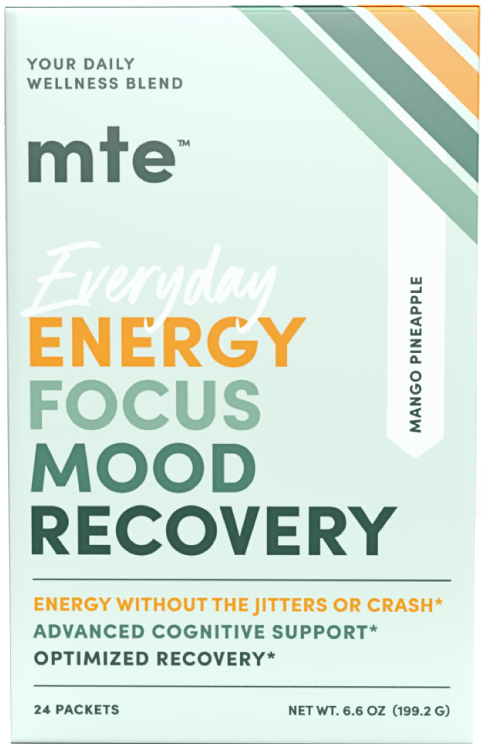
Wake Up Water® vs MTE®: Different Generations of Energy Drinks
Table of Contents
- Comparing Wake Up Water and MTE
- How Wake Up Water and MTE Work
- Benefits of Wake Up Water and MTE
- Wake Up Water Ingredients vs. MTE Ingredients
- Wake Up Water vs MTE Pricing & Packaging
- Other Highlights Wake Up Water vs. MTE
Intro
To Caffeinate or Not to Caffeinate? Comparing Wake Up Water & MTE Energy Powders
In today’s world, there are almost too many choices. 100 dating options at the swipe of a screen. A thousand Amazon results for the best skincare serum. 5 cafes within 2 blocks of each other in your hometown. And the energy drink market is not different, which is probably why you’re doing research on different products.
It can be cumbersome (and a little tedious) to stab around the internet in the dark, hoping to stumble upon the best healthy energy drink powder, especially if you’re really into the ingredients and their safety and efficacy (which we definitely are!). So here’s to making it easy. Let’s look at Wake Up Water vs MTE - from the specs to the science.
How it Works
Stressful vs Stress-Free: MTE vs Wake Up Water Energy-Boosting Mechanisms
We like to think of Wake Up Water as a 2.0 version of traditional energy drinks. Does it still rely on a high dose of caffeine to wake you up? Yes. Does it still use sketchy stuff in its formula? No. The quickest review ever of caffeine’s energy-boosting bioactivity:
Caffeine is a nervous system agonist that triggers a false stress response, which promotes wake-up neurochemical signaling while blocking calm-down and I’m-tired signaling. Caffeine basically tells your body something important is happening and it needs to (1) mobilize all the energy it can find RIGHT NOW and (2) for all the calm-down and I'm-tired chemicals to shut up.
If Wake Up Water is generation 2.0, no offense, but MTE’s into 3.0 territory. Instead of stimulating a stress response, MTE supports feel-good neurochemical signaling while modulating wake-up vs calm-down neurotransmitters and hormones. How? Adaptogens, nootropics, and a better alternative to caffeine: paraxanthine
Adaptogens are naturally-occurring, plant-sourced compounds whose bioactivity helps the brain and body better adapt to stress. Nootropics, another class of bioactive compounds, promote cognitive health, mood and immunity, among other things. When the body operates in balance, your natural energy production, mobilization and storage processes do the work of helping you feel more awake, which eliminates the need to rely on caffeine.
Benefits
Here for a Good Time or a Long Time? Benefits of Wake Up Water vs MTE
So, agonists vs modulators: what are the advantages of each? Is one better than the other? We’d argue so. MTE’s adaptogenic energy drink powder offers numerous benefits via modulation, including:
- More energy
- Better stress resilience
- Increased focus and concentration
- Calm, even mood
- Quality rest at night
- Immune function
- Inflammatory response
- Gut support
Wake Up Water’s clean energy drink mix offers a different set of benefits in its caffeine + electrolyte mix, since caffeine is an agonist:
- Energy boost
- Better focus
- Better hydration
This is another place you can really see the difference in where Wake Up Water sits and how MTE has blown past it. The 175mg dose of caffeine in one packet of Wake Up Water is enough that some people may get the jitters, and if you drink it in the afternoon, it’ll likely mess up your sleep. Regardless of the fact that the noticeable energy boost of caffeine wear off in a couple hours, its biological effects can last 8-10 hours, depending on the person.
On the other hand, the adaptogens and nootropics in MTE promote balanced wakefulness without the harmful effects caffeinated energy drinks have on your circadian rhythm. Utilizing paraxanthine vs caffeine results in a natural, jitter-free energy boost. This results in two things you can’t say of caffeine: (1) short-term energy that doesn’t feel tense or result in a crash, and (2) long-term, systemic support for the body’s natural energy production, storage, and use mechanisms.
Ingredients
How It’s Made: MTE & Wake Up Water Nutritional Profiles
We can already see how MTE is designed more as a daily wellness powder than simply a natural energy drink. Energy is a focus, but really just the tip of the iceberg in terms of benefits! So what’s inside these mysterious energy drink powders? It’s no mystery. Both MTE and Wake Up Water have ingredients lists small enough for a goldfish’s attention span:
Wake Up Water Ingredients:
- Citric Acid: natural flavor and stabilizer
- Natural Flavors
- Taurine: an amino acid that protects brain health and cell function
- Sodium Citrate: natural stabilizer
- Caffeine: 175mg blend – yerba mate, green tea, guarana
- Stevia: natural sugar alternative
- Monk Fruit Extract: natural sweetener
- Dipotassium Phosphate: source of potassium and phosphorus, stabilizer
- Niacin: vitamin B3, supports energy production, cognitive health, nervous system function, gut health, and promotes activity of feel-good neurotransmitters
- Pantothenic Acid: vitamin B5, supports energy production, regulates hormones, supports fat and cholesterol metabolism, red blood cell formation
- Vitamin B6: supports immune function, energy production, amino acid metabolism, and modulates neurochemical activity related to energy, mood and motivation
- Vitamin B12: supports nerve function, DNA integrity, cognitive function, mood, energy production
MTE Ingredients:
- Paraxanthine: caffeine alternative nootropic that boosts energy, metabolism, performance, and focus without raising BP, HR, or disrupting sleep
- Ashwagandha: adaptogenic herb that promotes motivation, energy, focus, mood, stress resilience
- Spirulina: superfood that provides focused nutrition for immunity, inflammation, endurance
- Saffron: nootropic support for mood, memory, brain health, sleep quality
- Eleuthero: adaptogenic herb that promotes immunity, energy, nerve health, stamina
- Holy Basil: adaptogen and superfood that promotes immune function, stress response, energy, and promotes mental health
- Amaranth: superfood known for improving endurance, stamina, longevity, nutrition
- Maca: adaptogenic vegetable that supports mood, energy, stamina, endurance
- L-Theanine: amino acid and nootropic that supports tranquil mood, calm concentration, sleep health
- GABA: nootropic amino acid and native neurotransmitter that promotes relaxation, calm mood, rest and recovery, stress response, immunity
- Chicory Root: superfood that supports gut health, blood sugar, stress response, and fights inflammation
- Malic & Citric Acids: natural flavor and stabilizer
- Stevia: naturally-derived sugar alternative
- Natural Colors: exberry
- Natural Flavors: sea salt, mandarin orange/lemon-lime/mango pineapple
Pricing & Packaging
Healthy Energy Drinks Are Less Costly than Traditional Energy Powders
A quick look at the logistics of Wake Up Water and MTE as they compare to mainstream energy drinks like Monster®, which costs $2.50-$3.50 on average:
MTE’s feel-good drink powder comes in 24-packs of single-serving sticks so you can grab, mix, and go anytime, anywhere. If you choose to go a la carte, it evens out to $2.70/serving. If you choose a subscription (which we recommend, since adaptogens and nootropics work systemically), this drops to $2.30/serving.
Wake Up Water’s clean energy powder comes in bags of single-serving sticks. The company offers different quantity options, including bags of 15, 30, 45 and 60. A 15-pack bag comes out to $1.66/serving, and a 60-pack bag evens out to $1.41/serving.
Both are pretty affordable options as far as a daily wellness habit goes. And both brands also maximize convenience and minimize packaging by offering their nootropic energy powders in this form. Plus, MTE uses sustainable cardboard packaging as opposed to a plastic bag.
Other Highlights
Other Things You Should Know About MTE & Wake Up Water
Listen; Wake Up Water isn’t all bad. People who can handle high doses of caffeine will find it useful for an effective energy boost, especially in situations where you might feel extra-fatigued. And it’s not like they’re not straightforward about what they do – its name says it all.
However, we can’t deny that caffeine isn’t without its pitfalls, which include tolerance and dependence. And our theory of healthy energy just doesn’t vibe with that, which is why our daily energy greens mix doesn’t rely on it to give you the feel-good energy you’re looking for. But, to each their own.
Other positive aspects of Wake Up Water include:
- Low-calorie
- Nothing artificial
- Vitamin B complex
Other important dietary specs on MTE include:
- No sugar bombs or artificial sweeteners
- Caffeine-free energy
- Low-calorie
- Keto
- Gluten-free
- Dairy-free
- Kosher
- Halal
Want to know more about the new generation of energy drink powders? Take a look!



